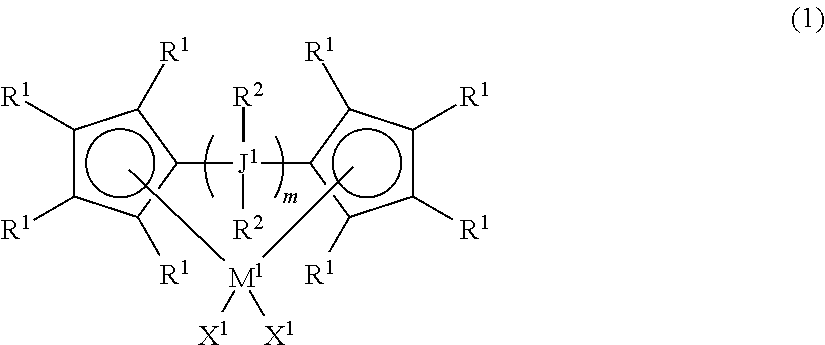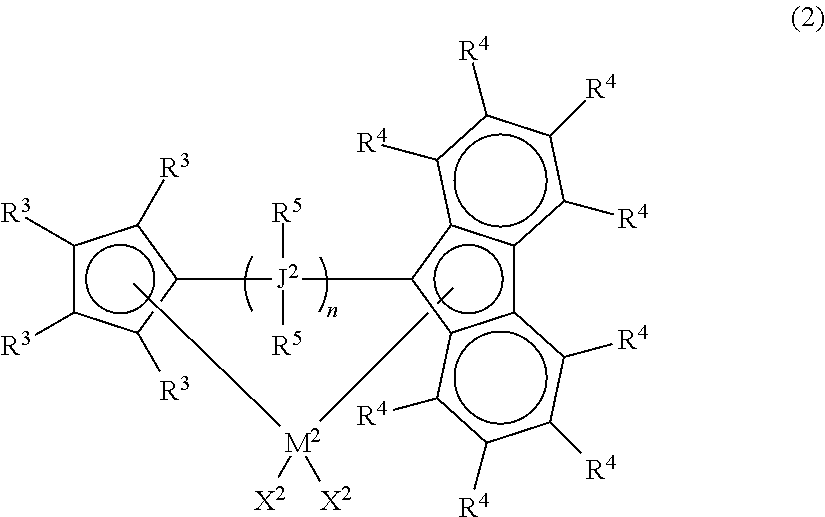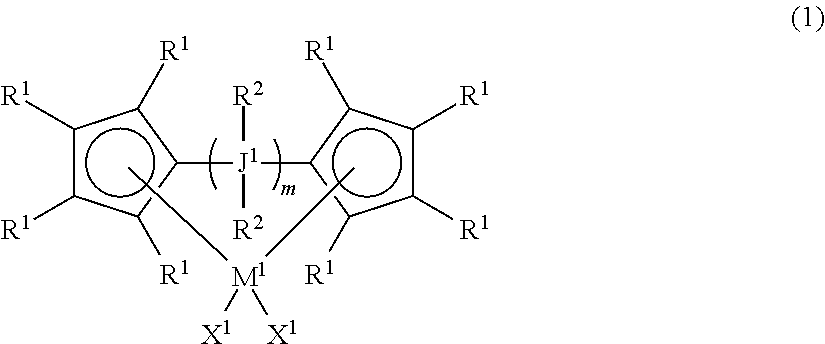Ethylene-.alpha.-olefin copolymer, molded article, catalyst for copolymerization, and method for producing an ethylene-.alpha.-olefin copolymer
a technology of alpha olefin and copolymer, which is applied in the direction of catalyst activation/preparation, physical/chemical process catalysts, chemical/physical processes, etc., can solve the problems of further reduction of extrusion load, sufficient take-up properties, and extrusion load at molding processing, so as to achieve superior take-up properties, low extrusion load, and low extrusion load
- Summary
- Abstract
- Description
- Claims
- Application Information
AI Technical Summary
Benefits of technology
Problems solved by technology
Method used
Image
Examples
example 1
(1) Preparation of Solid Catalyst Component
[0249]Into a nitrogen-replaced reactor equipped with a stirrer were fed 2.8 kg of silica (Sylopol948 manufactured by Debison) which had been heat-treated at 300° C. under nitrogen flowing and 24 kg of toluene, and the mixture was stirred. Thereafter, after cooled to 5° C., a mixed solution of 0.9 kg of 1,1,1,3,3,3-hexamethyldisilazane and 1.4 kg of toluene was added dropwise for 30 minutes while a temperature of the reactor was retained 5° C. After completion of addition, the mixture was stirred at 5° C. for 1 hour, then, the temperature was raised to 95° C., and the mixture was stirred at 95° C. for 3 hours, and filtered. The resulting solid product was washed with 20.8 kg of toluene six times. Thereafter, 7.1 kg of toluene was added to form a slurry, and the slurry was allowed to stand overnight.
(2) Polymerization
[0250]An autoclave equipped with a stirrer having an internal volume of 3 l, which had been replaced with argon after drying un...
example 2
(1) Polymerization
[0251]An autoclave equipped with a stirrer having an internal volume of 3 l, which had been replaced with argon after drying under reduced pressure, was evacuated, hydrogen was fed so that its partial pressure might become 0.01 MPa, 180 ml of 1-hexene, and 650 g of butane as a polymerization solvent were fed, and a temperature was raised to 70° C. Thereafter, ethylene was fed so that its partial pressure might become 1.6 MPa, and the system was stabilized. As a result of gas chromatography analysis, a gaseous composition in the system was hydrogen=0.7 mol %. Into this 0.9 ml of a hexane solution of triisobutylaluminum as an organoaluminum compound (C), the concentration of which had been adjusted to 1 mol / l, was fed. Then, 3.125 ml of a toluene solution of dimethylsilanediylbis(cyclopentadienyl)zirconium dichloride [corresponding to transition metal compound (A1)], the concentration of which had been adjusted to 2 mmol / ml, and 0.5 ml of a toluene solution of diphen...
example 3
(1) Polymerization
[0252]An autoclave equipped with a stirrer having an internal volume of 3 l, which had been replaced with argon after drying under reduced pressure, was evacuated, hydrogen was fed so that its partial-pressure might become 0.02 MPa, 180 ml of 1-hexene, and 650 g of butane as a polymerization solvent were fed, and a temperature was raised to 70° C. Thereafter, ethylene was fed so that its partial pressure might become 1.6 MPa, and the system was stabilized. As a result of gas chromatography analysis, a gaseous composition in the system was hydrogen=1.2 mol %. Into this 0.9 ml of a hexane solution of triisobutylaluminum as an organoaluminum compound (C), a concentration of which had been adjusted to 1 mol / l, was fed. Then, 3.125 ml of a toluene solution of dimethylsilanediylbis(cyclopentadienyl)zirconium dichloride [corresponding to transition metal compound (A1)], the concentration of which had been adjusted to 2 mmol / ml, and 0.5 ml of a toluene of solution of diphe...
PUM
| Property | Measurement | Unit |
|---|---|---|
| melt flow rate | aaaaa | aaaaa |
| density | aaaaa | aaaaa |
| temperature | aaaaa | aaaaa |
Abstract
Description
Claims
Application Information
 Login to View More
Login to View More - R&D
- Intellectual Property
- Life Sciences
- Materials
- Tech Scout
- Unparalleled Data Quality
- Higher Quality Content
- 60% Fewer Hallucinations
Browse by: Latest US Patents, China's latest patents, Technical Efficacy Thesaurus, Application Domain, Technology Topic, Popular Technical Reports.
© 2025 PatSnap. All rights reserved.Legal|Privacy policy|Modern Slavery Act Transparency Statement|Sitemap|About US| Contact US: help@patsnap.com



